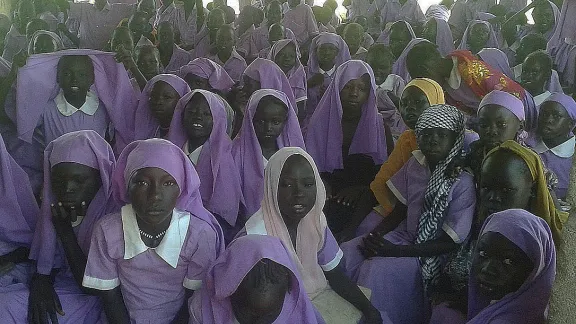
A fully attended classroom with school girls going on with learning unperturbed by the security situation. Photo: LWF South Sudan
After the incidences in Maban on 3rd of August where 5 humanitarian agency staff were deliberately targeted and killed, many agencies including LWF were forced to evacuate the staff out of the location. A number of NGOs – including LWF World Service – gave a joint statement condemning the targeted killing of aid workers and set down five clear parameters to be met before they were ready to return to full scale operation. After an assessment of the situation and a meeting with local authorities, on 22 August the LWF allowed 4 staff to report back to Maban.
By Collins Onyango
While the evacuated staff remained away for about three weeks, the locally recruited team took charge of the operation. They prioritized the safety of the LWF base in Bunj where 4 of them moved into the compound that normally accommodates 30 people to work hand in hand with security guards. They kept the evacuated staff posted on developments while ensuring that all security related routines and cleaning continued uninterrupted. Upon arrival, it was very impressive to note that everything had been maintained intact. All we needed to do was to clear the long grass that had grown due to the ongoing rains in Maban.
All Primary Schools Maintained Instruction
After their return, the evacuated staff joined hands with the local staff which had been on the ground all along and embarked on an assessment to establish the situation of refugees/ beneficiaries since the suspension of LWF activities. It was pleasant to note that the community based staff had carried on their routine activities. All 15 primary schools in the 3 camps that LWF provides support to have been running normally with the support of case workers who have continued to conduct community assessments. They have been able to record some new cases of children that need protection interventions. The immediate and unaddressed issues during LWFs’ absence in the camps were lack of material support for children at risk, replenishing of school supplies and payment of the refugee staff salaries which were due since mid August 2014.
Based on the daily security updates and meetings with partner agencies, some of the key indicators for safe return have continued to improve. The extension of the UNIMISS force protection presence in Maban led to a consensus to increase the general essential staff presence in Maban to 200 (from 175.) The LWF therefore was able to increase the team. We anticipate an additional 4 more staff to reach the number of 12 international staff for our operation in Maban. The team of 12 can easily be evacuated in one charter should the situation deteriorate again. This will put us in a position to ensure some support to the refugee children who are in dire need of our services.
Plans are now underway for the team to carry out distributions to all the schools starting from Monday 1st of September 2014 along with targeted distribution of material support items for child protection cases. Despite these efforts, we have to recognize that the situation in Maban will not remain the same with the many armed groups currently active in the region. While the situation currently is calm, it remains very unpredictable and we have to apply all the necessary caution at all times even as we endeavor to give the much needed humanitarian aid to the refugees from the Sudan.
Onyango Collins is the (outgoing) leader of the Maban team in LWF South Sudan.


